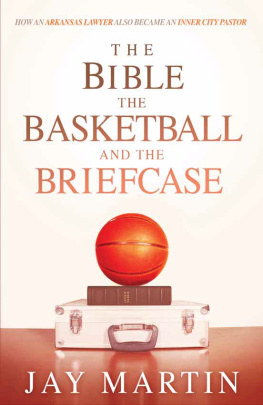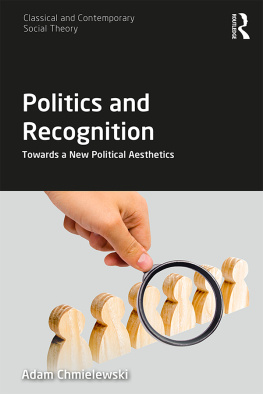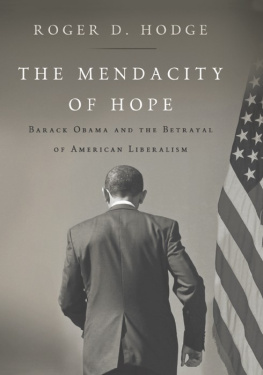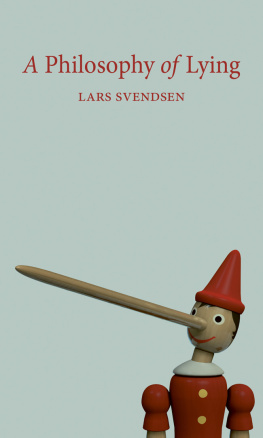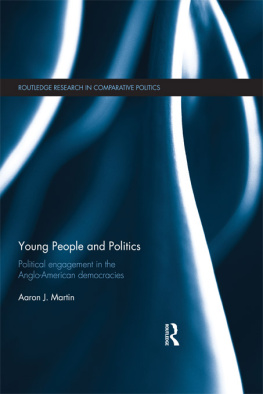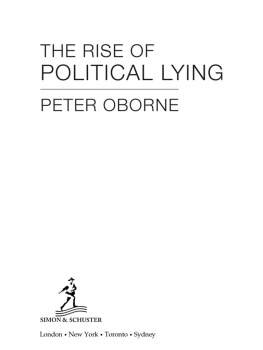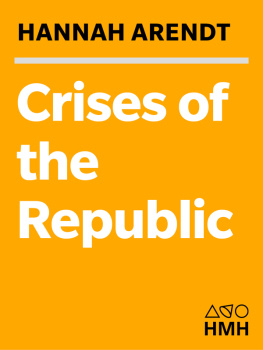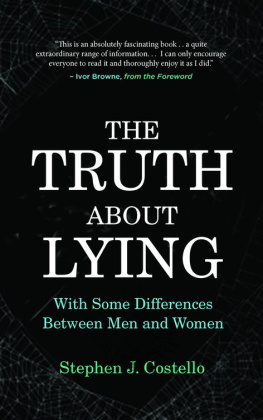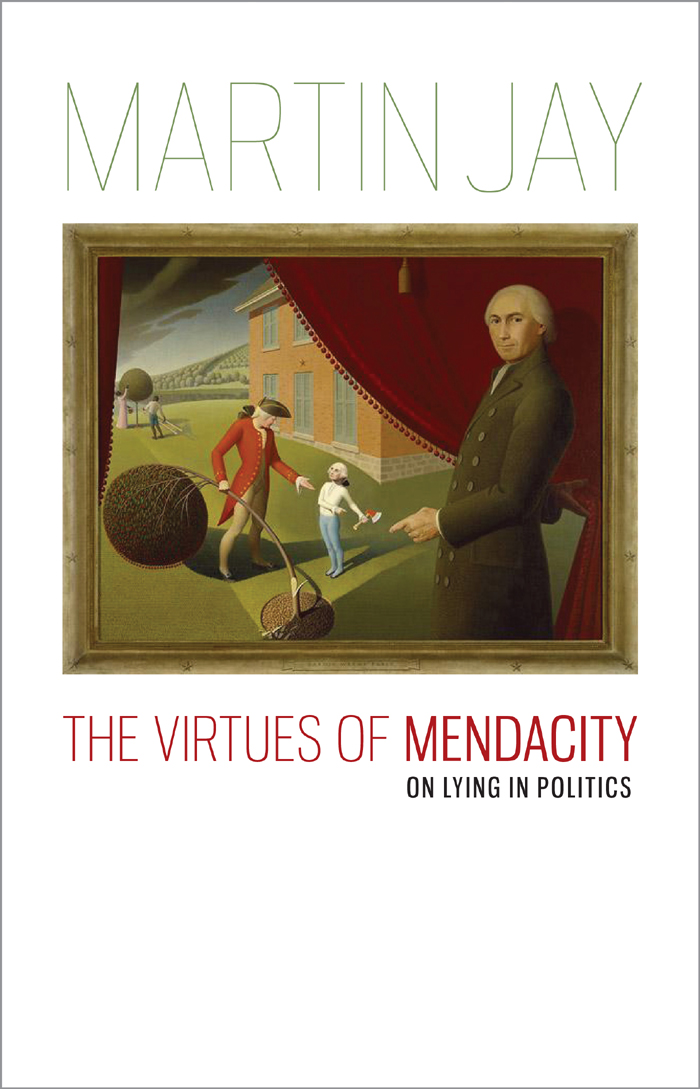THE VIRTUES OF MENDACITY
RICHARD LECTURES FOR 2008
THE VIRTUES OF
MENDACITY
ON LYING IN POLITICS
Martin Jay
UNIVERSITY OF VIRGINIA PRESS
CHARLOTTESVILLE AND LONDON
University of Virginia Press
2010 by the Rector and Visitors of the University of Virginia
All rights reserved
Printed in the United States of America on acid-free paper
First published 2010
9 8 7 6 5 4 3 2 1
LIBRARY OF CONGRESS CATALOGING-IN-PUBLICATION DATA
Jay, Martin, 1944
The virtues of mendacity : on lying in politics / Martin Jay.
p. cm. (Richard lectures for 2008)
Includes bibliographical references (p. ) and index.
ISBN 978-0-8139-2972-9 (cloth : alk. paper) ISBN 978-0-8139-2976-7 (e-book)
1. Truthfulness and falsehood. 2. Political ethics. 3. Political sciencePhilosophy. I. Title.
BJ1421.J39 2010
172--dc22 2009039437
For Ruby and FidelLet sleeping dogs lie.
CONTENTS
PREFACE
It might easily be assumed that this book was conceived during the ill-starred presidency of George W. Bush when indignation against political mendacity reached new heights in the American public sphere. Matched only in popularity by the widespread charge of incompetence, which gained special traction after the grievous mishandling of Hurricane Katrina, duplicity became the favorite target of the administrations burgeoning legion of critics. Although there were many examples to bolster this image, it was the slew of lies intended to dupe the American people into supporting an immoral and unnecessary war on Iraq that did the most damage. When the war turned sour, even the popular media jumped on the bandwagon, as demonstrated by the cover of the July 21, 2003, issue of Time, whose headline read Untruth and Consequences: How Flawed Was the Case for Going to War against Saddam?
Although it certainly is the case that the brouhaha over political mendacity during the Bush administration focused my attention, it was in fact first attracted well before it began. In 1999 the London Taking my cue from this diatribe, which expressed Hitchenss own outrage at the way Clintons handling of the Monica Lewinsky affair typified his entire tenure in office, I began thinking seriously about the more general role of mendacity in politics.
The review appeared under the title Mendacious Flowers in the July 29, 1999, issue of the LRB, and tentatively advanced some of the arguments I will be making in this book. The response was vigorous and mostly positive, although there was one critical exception that I will always cherish. Referring to the fact that I had just assumed the chairmanship of my department, the correspondent thundered: If you believe what you seem to believe, you have no business being the chair of the best history department in the country! I immediately pondered the implications of this charge, realizing with perverse excitement that any project that might relieve me of the duty of chairing was one worth pursuing. But as luck would have it, I was already deeply involved with another challenging project, which was published in 2004 as Songs of Experience after I had completed my term as departmental chair. The evident passion that my initial attempt to think about lying in politics had engendered was not, however, forgotten, and once the opportunity to start a new major project emerged, I returned to the theme.
The result is the book that, as it were, lies before you (or rather tries to tell some truths about lying). It is motivated by one cluster of fundamental questions: Why is there such a frequent and ubiquitous linkage between politics and mendacity? Why is virtually the first accusation hurled at a political opponent when things get ugly the charge of misrepresentation or duplicity? Why is lying in politics both impossible to eradicate and yet never easily condoned? Is there something special about the realm of human behavior we call politics that allows mendacity to prosper, despite all the high-minded attempts to condemn and punish it? Does it perhaps even serve positive functions, despite its all too obvious negative ones? Would different interpretations of the essence of the political, as it has come to be called, have different implications for answering these questions?
As I began to mull over these perplexing issues and begin my research into the vast literature that has accumulated around the question of lying in general and lying in politics in particular, it was especially instructive to see the transformation of the very same Christopher Hitchens who had so excoriated Bill Clinton as a serial liar into a staunch defender of George Bushs war in Iraq. Turning intellectual somersaults to justify the invasion and applying his considerable rhetorical skills to skewer anyone on the other side, Hitchens lost his righteous indignation about mendacity and focused his attention on the larger strategic and ideological questions served by ridding the world of Saddam Hussein. Was he being hypocritical, applying a double standard, or merely shrewdly selective in directing his wrath? Did he perhaps come to the sober conclusion that there are worse sins in politics than failing to observe the highest standards of veracity? If the latter was the case, he was not the first to come to this conclusion. To explain why it may be more than just a sign of moral weakness, self-serving expediency, or world-weary cynicism is the goal of this exercise.
ACKNOWLEDGMENTS
Truth be told, there is no more perilous enterprise than trying to acknowledge the innumerable acts of kindnessor at times painfully pointed criticismsthat abet the composition and publication of a book. From the initial invitation by the London Review of Books in 1998 to review two volumes on the presidency of Bill Clinton, which first aroused my interest in the theme of political mendacity, to the efforts of the University of Virginia Press and its talented staff to turn the manuscript into a book, I have benefited from countless individuals and institutions who have contributed in one way or another to the project. The difficulty, of course, comes in doing justice to all of them, given the vagaries of memory and my failure to record every piece of advice I got along the way. So let me acknowledge at the outset the radical incompleteness of these acknowledgments, and beg the pardon of those who are negligently, but not malevolently, omitted.
I should begin by thanking the institutions that allowed me the time and resources to do the research that underpins my argument, and provided the audiences that helped to hone it with their constructively skeptical responses. I had the great good fortune to spend my 20045 sabbatical at the National Humanities Center as the John P. Birkelund Fellow. Geoffrey Galt Harpham, Kent Mullikin, and the extraordinary staff of the Center provided every amenity that a scholar could desire. The forty or so other fellows in residence that year managed to steal enough time away from their own projects to respond with great generosity to my own. I was also supported throughout the years I worked on this book by the Sidney Hellman Ehrman Chair at the University of California, Berkeley, which I have been lucky to share with my distinguished colleague Jan de Vries since 1996. As has always been the case since I went on my first sabbatical in 1974, the Humanities Research Fellowship program at Berkeley has also given generously to top off my sabbatical salary.
Opportunities to air my inchoate ideas on the subject of this book were afforded by a wide range of audiences: the Humanities Institute, University of Buffalo; the Department of History, University of Maryland; the Political Science Department, CUNY; the Philosophy Department, Florida Atlantic University; the Humanities Department, Technological University of Monterrey, Mexico City; the Visiting Scholars Program, James Madison University; the conference Ethics and Politics, Heraklion, Crete; the Philosophy Department, University of Wroclaw, Poland; the conference The Politics of the Past, Jyvskyl, Finland; the European University of St. Petersburg, Russia; the Unit for Criticism and Interpretive Theory, University of Illinois; the Department of Performing Arts, Southern Illinois University; a conference on Marxs


